You approach via an aisle of ram-headed sphinxes:


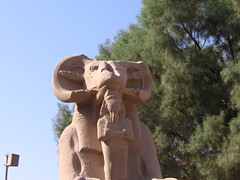
(I really like the sphinxes...)
and come to the First Pylon (gateway). It's actually the back of this pylon that is most interesting:

The pylon was never properly finished, and that stuff at the base is the original 2500 year old mud brick construction ramp! This is cool for the archaeologists because it tells them a lot about how the pylon was constructed.
Next we went into the hypostyle hall:
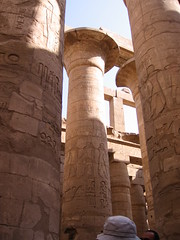
This would originally have been roofed over, but now the roof is gone and the hall is open to the sky. Many of the lintels between the pillars are still in place, though,

and they're covered with hieroglyphs. You can still see the colors, because the undersides of the lintels are in the shade:

As we penetrate deeper, we are tantalized by the sight of obelisks in the distance!
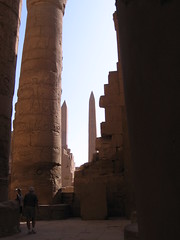
The biggest obelisk in the place - and the tallest surviving obelisk in Egypt - belongs to Queen Hatshepsut:

It's one of a pair; the other one didn't fare so well:

One of the interior gateways is framed by these pretty pillars with images of lotus flowers:
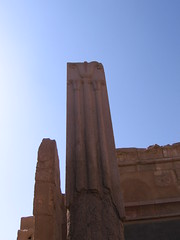
and papyrus reeds:

These are the symbols of Upper Egypt and Lower Egypt respectively.
Out to one side of the temple near the fallen obelisk, there is a giant scarab beetle

that is supposed to be lucky. If you walk around it 7 times clockwise, you're supposed to find true love or something. Don and Shirley said they didn't need it!

While Ihab was guiding us around and telling us all about the carvings, I noticed this guy following us. It seems he was a tourist from Germany who was there on his own, and he just attached himself to our group to get the benefit of Ihab's knowledge! I think that was pretty clever, and it didn't hurt us any.
Then Dad and I decided to make our way to the rear of the complex. There was an area called the "Botanical Garden" that I wanted to see (because I'd been reading my guide book again!) Well, we tried to get there and kept finding our way blocked by paths that didn't seem to really go anywhere. We finally decided that the only option we could see was to go straight through what I think is the Sanctuary of the Temple of the Middle Kingdom (map here). This was a series of three enclosed chambers which were, like most sanctuaries in Egyptian temples, raised above the ground level. At the far end of the third chamber, you could get out through a hole in the wall - but it was maybe three feet above the level of the path outside.
Now I, in my 40s, sat down on the ledge and scooted off it, dropping less than a foot. No problem. Dad, on the other hand - a little bit older than me, does a flying Wallenda off the ledge and just lands on his feet, rocking a little but otherwise unfazed, right in front of the Green Group leader who was just rounding the corner on the path we couldn't find.
Oh well. At least we gave some folks their excitement for the day!
The botanical garden area was put in by Tuthmosis III, the nephew of Queen Hatshepsut. He spent most of his summers out leading military expeditions in the lands of the Hittites and Assyrians, and while he was out there he saw a lot of plants and animals that you don't get in Egypt. When he came back in the winters, he had his artists attempt to carve what he'd seen. Since he was working from memory, the depictions aren't really botanically accurate, but it was interesting.
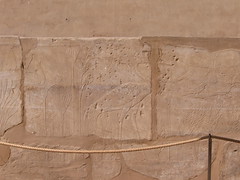

These'll probably show up better if you click to make them bigger.
While we were back there, we got Abe and Mary

to take our picture.

The back part of the temple is very extensive, but it isn't in very good repair compared to the front:

As we worked our way out, we came upon this pharaoh:
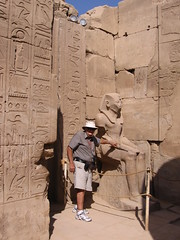
I don't know who he is, but I liked him. He's a little more life-sized than some (*cough*Rameses*cough*).
Here's the great colonnade from a better angle (also the sun was further up by this time)

These columns are freakin' huge!

I still love the ram-headed sphinxes best!


No comments:
Post a Comment